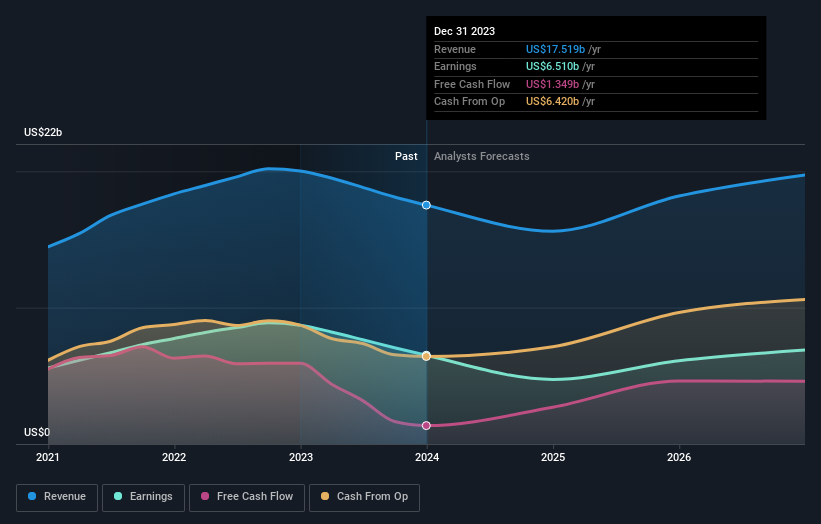- United States
- /
- Semiconductors
- /
- NasdaqGS:TXN
These Analysts Just Made A Notable Downgrade To Their Texas Instruments Incorporated (NASDAQ:TXN) EPS Forecasts

Market forces rained on the parade of Texas Instruments Incorporated (NASDAQ:TXN) shareholders today, when the analysts downgraded their forecasts for this year. Revenue and earnings per share (EPS) forecasts were both revised downwards, with the analysts seeing grey clouds on the horizon.
Following the downgrade, the consensus from 29 analysts covering Texas Instruments is for revenues of US$16b in 2024, implying a definite 11% decline in sales compared to the last 12 months. Statutory earnings per share are anticipated to plunge 29% to US$5.08 in the same period. Prior to this update, the analysts had been forecasting revenues of US$18b and earnings per share (EPS) of US$6.51 in 2024. It looks like analyst sentiment has declined substantially, with a measurable cut to revenue estimates and a large cut to earnings per share numbers as well.
Check out our latest analysis for Texas Instruments

Analysts made no major changes to their price target of US$169, suggesting the downgrades are not expected to have a long-term impact on Texas Instruments' valuation.
One way to get more context on these forecasts is to look at how they compare to both past performance, and how other companies in the same industry are performing. These estimates imply that sales are expected to slow, with a forecast annualised revenue decline of 11% by the end of 2024. This indicates a significant reduction from annual growth of 6.7% over the last five years. Compare this with our data, which suggests that other companies in the same industry are, in aggregate, expected to see their revenue grow 17% per year. It's pretty clear that Texas Instruments' revenues are expected to perform substantially worse than the wider industry.
The Bottom Line
The biggest issue in the new estimates is that analysts have reduced their earnings per share estimates, suggesting business headwinds lay ahead for Texas Instruments. Regrettably, they also downgraded their revenue estimates, and the latest forecasts imply the business will grow sales slower than the wider market. The lack of change in the price target is puzzling in light of the downgrade but, with a serious decline expected this year, we wouldn't be surprised if investors were a bit wary of Texas Instruments.
As you can see, the analysts clearly aren't bullish, and there might be good reason for that. We've identified some potential issues with Texas Instruments' financials, such as concerns around earnings quality. Learn more, and discover the 1 other concern we've identified, for free on our platform here.
Another way to search for interesting companies that could be reaching an inflection point is to track whether management are buying or selling, with our free list of growing companies that insiders are buying.
Valuation is complex, but we're here to simplify it.
Discover if Texas Instruments might be undervalued or overvalued with our detailed analysis, featuring fair value estimates, potential risks, dividends, insider trades, and its financial condition.
Access Free AnalysisHave feedback on this article? Concerned about the content? Get in touch with us directly. Alternatively, email editorial-team (at) simplywallst.com.
This article by Simply Wall St is general in nature. We provide commentary based on historical data and analyst forecasts only using an unbiased methodology and our articles are not intended to be financial advice. It does not constitute a recommendation to buy or sell any stock, and does not take account of your objectives, or your financial situation. We aim to bring you long-term focused analysis driven by fundamental data. Note that our analysis may not factor in the latest price-sensitive company announcements or qualitative material. Simply Wall St has no position in any stocks mentioned.
About NasdaqGS:TXN
Texas Instruments
Designs, manufactures, and sells semiconductors to electronics designers and manufacturers in the United States, China, rest of Asia, Europe, Middle East, Africa, Japan, and internationally.
Adequate balance sheet with moderate growth potential.
Similar Companies
Market Insights
Community Narratives



